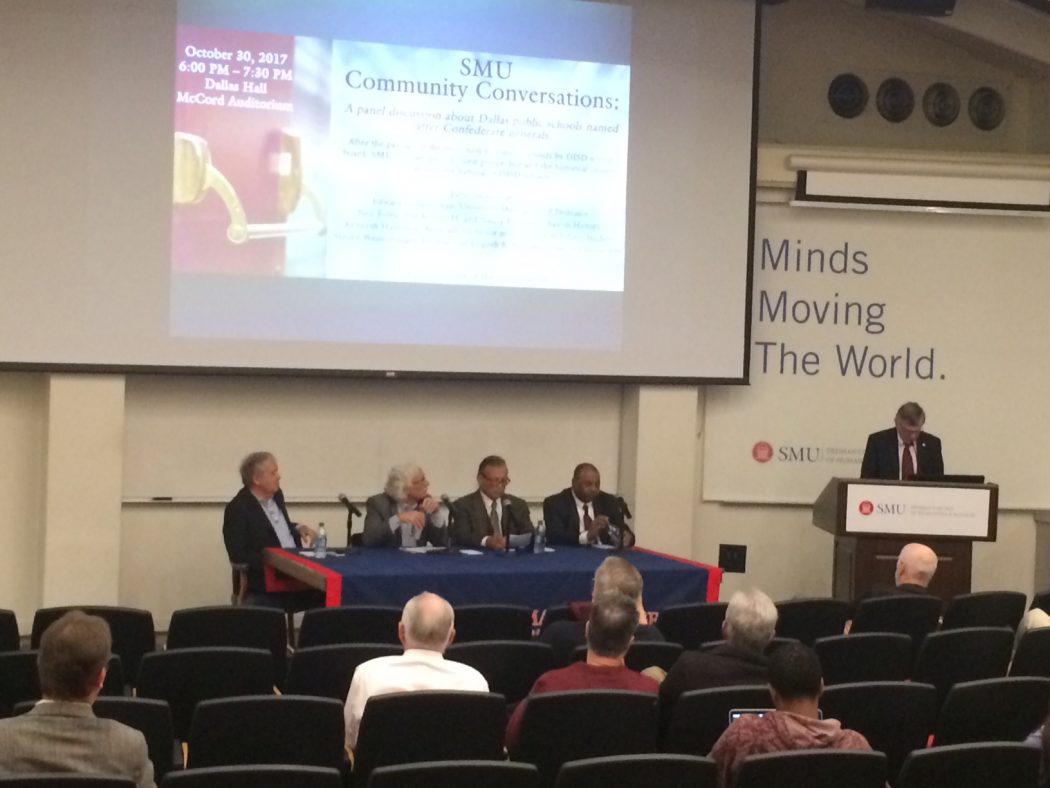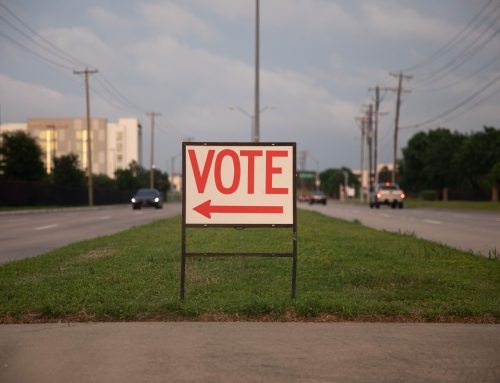
Students, professors and neighbors gathered Monday night to participate in a panel discussion about Confederate school names in Dallas ISD at Southern Methodist University (SMU).
A crowd of around 100 gathered to hear four SMU professors discuss the historical context of the era in which these schools were named. Due to its proximity, most of the discussion and questions centered around Stonewall Jackson Elementary, whose new name will be submitted to the Dallas ISD trustees in February.
The professors discussed the efforts of the Confederate support groups such as the Sons of Confederate Veterans and the Daughters of the Confederacy after the Civil War to create a new narrative about a war about states rights and of Northern aggression, rather than a fight to end slavery. Edward Countryman, a history professor, noted the explicit preservation of slavery in many of the southern states’ Ordinances of Secession. Texas’ Ordinance of Secession reads, “She was received as a commonwealth holding, maintaining and protecting the institution known as negro slavery — the servitude of the African to the white race within her limits — a relation that had existed from the first settlement of her wilderness by the white race, and which her people intended should exist in all future time.”
English professor Stephen Weisenberger, who lives six doors down from Stonewall Jackson Elementary, outlined a document called the Confederate Catechism, which established an alternate narrative to the reasons for the Civil War. The catechism describes the “unmitigated abuse of the South” that lead to war and that “the South seceded because it wanted peace and not strife or war.”
He said that when these schools were named, this document was ubiquitous, and so were its proponents. “When these things were named, these organizations were there,” he said. “They were lobbying and packing the meeting rooms.”
Many of the Confederate-named schools in Dallas were named during a highly segregated time in Dallas’ Jim Crow history, where the Ku Klux Klan had influence on many of the stakeholders at the time, noted Ethnic Studies professor Kenneth Hamilton.
Those who spoke up at the meeting generally were in favor of changing the name, but one man did mention that homeowners had bought houses in the Stonewall Jackson attendance zone because of the Stonewall name and its reputation. He wondered if changing the name might impact the property values. Hamilton, the only black member of the panel, responded with an emphatic “no” in the most heated moment of the panel.
“It’s not the branding, but the quality of instruction that matters,” he said. “As long as it’s there, the property values will remain.”
For Hamilton and the other panelists, several of whom had close connections with the school and neighborhood, changing the name would improve the perception and value in the neighborhood.
Comparisons were made between the Confederacy and other losing sides in wars, with the panel noting the lack of buildings and roads named for British military officers, Benedict Arnold or Santa Anna. One audience member asked why this is still such an issue in the US when it isn’t as much of an issue in post-Nazi Germany or post-Apartheid South Africa. Two answers came forward. One audience who had been part of Dallas ISD’s slowly integrating student population noted that slavery was a tradition for hundreds of years, while the Nazi and Apartheid regimes lasted mere decades. The panel noted the lack of a national conversation where all parties owned up for what was a deplorable practice, which allowed for alternate narratives to be propagated.
History Professor Neil Foley discussed the recent compromise that was made in Austin, where Robert E. Lee Elementary was renamed Russell Lee Elementary, after a photographer and University of Texas professor who captured the downtrodden in photos and lived in that neighborhood. An audience member mentioned how that might be a convenient way to leave the name as Lee Elementary, but Foley found that to be a good solution to the problem because of the current namesake. Stonewall Jackson Elementary does not have the same opportunity, as the Board of Trustees stated that no portion of the old name could be used in the new one.
The meeting ended on a hopeful note, when a Stonewall parent on the school’s renaming committee discussed the power a name change could bring. “Never have I felt closer to claiming our place in history,” she said. “We are ready to claim that we don’t want this name because its not emblematic of what we want our school to be.”





